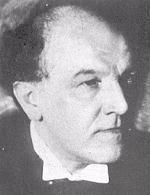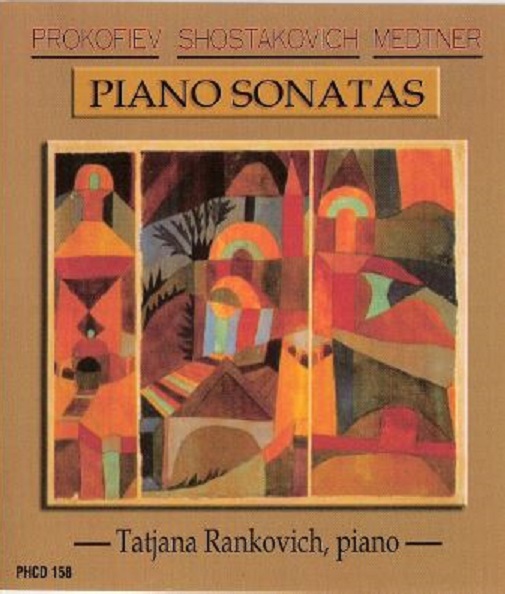
Medtner, Nicolai
Nikolai Medtner was born in Moscow on 5 January 1880. He was descended from Livonians — Germans long settled in the Baltic countries — though he considered himself a Russian.
In his lifetime a great deal was made of his Teutonic rather than Slavic heritage, as if his exceptional grasp of form, and conservative idiom thought to resemble that of Brahms, set him apart — in Western eyes — from the more exotic and colourful Russian composers. Nevertheless it is the Russians who have taken him to their hearts. Perhaps too much is made of his ancestry; after all, Chopin is not considered a Frenchman, nor Schnittke a German.
His father, Karl Medtner, who owned a lace factory in Moscow, greatly admired Goethe and Pushkin and instilled in his son a profound love for poetry, art and philosophy. Medtner’s mother was a musician, and though Medtner chose music as a profession at a very early age, it was later remarked that few musicians ever frequented the Medtner home, which was famous rather as a centre for the discussion of philosophy and aesthetics.
After initial piano lessons with his mother, Medtner had the good fortune to study with Safonov at the Moscow Conservatoire. Safonov was a formidable teacher whose influence, handed down through two generations of pupils, can still be detected in the most recent of the Russian pianists. He gave Medtner a flawless technique and every assistance to embark on a virtuoso performing career. Medtner however chose to devote himself to composition, and under the guidance of Taneyev mastered the rules of harmony and counterpoint to an astonishing degree. The young composer-pianist graduated from teh Conservatoire in 1900, and his name is still to be seen in gold on the great plaques of honour, together with those of Rachmaninov and Scriabin.
Medtner returned to the Conservatoire in 1909 as a professor. Some idea of his original, and by all accounts memorable teaching may be found in the book compiled from his teaching notes ‘Pianist and Composer’s Everyday Work’. The recordings of the great pianist Vladimir Sofronitsky bear further witness to Medtner’s teaching. Sofronitsky spoke of his studies with Medtner affectionately and with gratitude.
Medtner resigned from teaching after one year in order to devote his time fully to composition, and several of his large-scale works date from this time, such as the Sonata in G minor, Op. 22, and the huge Sonata in E minor (Night Wind), dedicated to Rachmaninov. Returning to the Conservatoire in 1914 and resuming his professorship, Medtner continued to teach there throughout the First World War, the Revolution and its aftermath. His First Piano Concerto, the largest and greatest of his works written in Moscow, was composed during this exact period and was the last work premiered by its composer before he left Russia in 1921 for an uncertain life in the West.
Together with his wife, Anna, Medtner went first to Germany, then Paris, ending his travels in London in 1936. The contrast between the works of his Moscow period and the works of hihs exile is striking. The three cycles of Forgotten Melodies from 1918-1920 mark the point at which his music ceases to mirror the turbulent epoch. A new serenity is apparent, and in some cases a deliberate Russian flavour, perhaps nostalgic.
Medtner was now obliged to support himself and Anna by giving concerts in Western Europe and America. His traning under Safonov stood him in good stead as a performer, and, but for his rigid insistence on putting composition first and a disdain for any comromise associated with a virtuoso career, he would have been widely celebrated as a pianist the equal of Rachmaninov and Lhevinne. His concerts still linger in the memory of musicians today, who speak of his glowing sound and strikingly integrated playing, giving the effect of a string quartet or ensemble in which the inner voices were clear, the rhythmic pulse infectious, and the bass notes and harmonies supported by masterly pedalling. These qualities can be heard in Medtner’s recordings, but it is significant that the sound of this performances in the concert halls can be so readily recalled, after the passing of more than half a century.
Medtner returned to the Soviet Union for an extended concert tour in 1927, performing to a Russian public eager to hear the new works he had written in the West. His music continued to be published in Moscow during the 1920’s, but at the start of the new decade the official attitude to the composer changed, and performances of his music were not encouraged. Eventually in the late 1950s his collected works were published in the Soviet Union, edeited by Sofronitsky and Goldenweiser, which led to a revival of interest in Medtner’s music that continues in Russia to this day. During the Second World War Medtner completed his last major work, the Third Piano Concerto, and in the few years left before his death in 1951 he spent much of his energy, depleted by illness, recording his own works for EMI. Thes wonderful recordings were sponsored by the Maharajah of Mysore, who greatly admired Medtner’s music.
The composer died on 13 November 1951 and is buried in North London.
